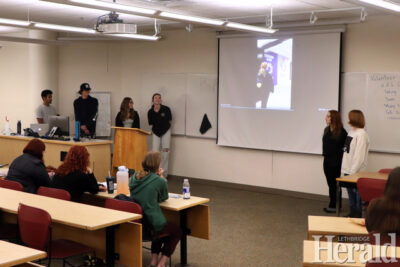Early Start program transitions students to university life
By Steffanie Costigan - Lethbridge Herald Local Journalism Initiative Reporter on September 7, 2023.
 Herald photo by Steffanie Costigan
Students in the Early Start Experience program present their final presentations last week at the University of Lethbridge.
Herald photo by Steffanie Costigan
Students in the Early Start Experience program present their final presentations last week at the University of Lethbridge. The University of Lethbridge has increased its first-year students’ retention rate with the Early Start Experience program, helping students to smoother transition from high school to university life.
Brendan Cummins, instructor in the School of Liberal Education at U of L shared the design of the Early Start Experience (LBED-1500) program and what students can expect in taking this program.
“This course is designed for first-year ,first-semester students. It’s set up very much as a welcome to university, a transition from that high school place to university. Because for a lot of students, this is not only just a new educational experience but a new cultural experience, an entirely new world. They’re leaving home, they’re coming to places that they’re unfamiliar with,” said Cummins.
The program is a full-credit course holding three credits behind it, and students are given the opportunity to learn and tour around the campus facilities. Students are also introduced to professors at the U of L in helping students transition from high school to university.
Cummins noted connecting students to the school helps first-year students to focus on their studies going forward.
“What we found over the years is that one of the ways to keep students engaged in their learning and stay focused on their learning is to give them connections to the place.”
Abby Jensen, a current student at U of L, voiced her experience taking the LBED-1500 program and the benefits she has experienced with transitioning into university.
“For me, this course has been incredibly beneficial. It has really impacted me significantly; I have really learned to cope with my emotions and how I’m feeling, how to time manage, because I’ve also been juggling a part-time job. It’s just been really impactful,” said Jensen.
The course includes 36 hours of instruction and is a two-week long program with five assignments to complete. Cummins said at the start of the class, students come into it shy, but by the end of it, they have more confidence and have made connections.
“They don’t say very much, and they don’t move around very much. And then you see today, where they’re in there chatting, they’re talking, they’ve made connections like we put them into teams.”
Cummins said School of Liberal Education Dean Shelly Wismath, studied first-year student’s struggles and discovered one of the factors had to do with high school students transitioning to university. He described the discovery and how he worked together with Wismath in a program to successfully transition first-year students into the university.
“We discovered that it is about that transition, the notion that from high school, the grading is different. The workload is different; the expectations are different. We thought ‘what would be a way to get students an opportunity to experience some of these things in a more supportive environment, where they’re not just dropped into it, where they get a chance to work through some of these things?'”
Keira Leivel is a student who also participated in the LBED-1500 program; she said this course should be a requirement for first-year students.
“I honestly think that this should be a requirement for first-year students wholeheartedly because this has been so good. The professors are the sweetest people. It’s been a fantastic course that taught us almost, I think, everything we’ll need to know to enter university. Without this course, I feel like I’d be a lost puppy,” said Leivel.
The course has been running successfully now for five years. In the first year of the program, there where 30 students. Now Cummins said class sizes are between 50 to 75 students. Cummins noted, according to an in-school survey done at the U of L, the program has had a 90 per cent retention rate.
“We see the retention rate at somewhere around 90 per cent of students who take this course because there they say that first semester is no longer of terror… Plus, they also have made connections to professors like Shelley and myself and to other professors that we bring in that they can go to for help.”
17-16




